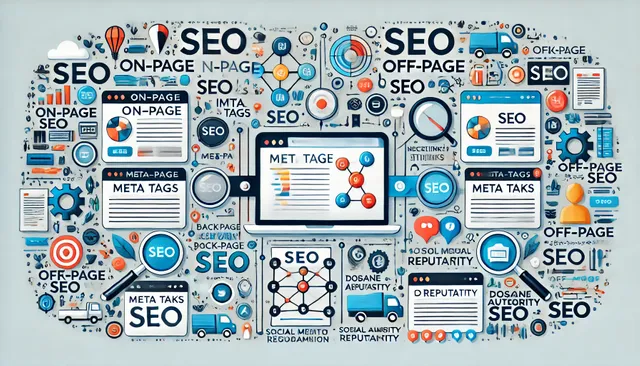The Difference Between On-Page and Off-Page SEO
The Difference Between On-Page and Off-Page SEO (And How to Crush Both)
You’re putting in the work—writing content, optimizing your site, maybe even building backlinks. But if you don’t understand the difference between on-page and off-page SEO, you’re leaving rankings (and money) on the table.
So let’s break it down—no fluff, just straight answers—so you can rank higher, drive more traffic, and get more leads.
What’s the Real Difference Between On-Page and Off-Page SEO?
On-page SEO = Everything you control on your website. Off-page SEO = Everything that happens outside your website that affects rankings.
Think of it like this:
-
On-page is your store’s interior (clean, organized, easy to navigate).
-
Off-page is your reputation (reviews, word-of-mouth, social proof).
Both matter. A lot.
On-Page SEO: Optimizing Your Website for Rankings
This is where most people start—and where many mess up. On-page SEO isn’t just stuffing keywords. It’s about making your site user-friendly, fast, and relevant to search engines.
Key On-Page SEO Factors
-
Keyword Optimization
-
Use your main keyword in:
-
Title tag (keep it under 60 chars)
-
URL (short & clean)
-
First 100 words of content
-
Headers (H1, H2, H3)
-
Meta description (under 160 chars)
-
-
But don’t overdo it—Google hates keyword stuffing.
-
-
Content Quality
-
Longer content ranks better (1,500+ words for competitive terms).
-
Break it up with subheaders, bullet points, and images.
-
Answer search intent—are people looking for info, products, or reviews?
-
-
Technical SEO
-
Page speed (use Google PageSpeed Insights).
-
Mobile-friendly design (non-negotiable in 2024).
-
Internal linking (connect related pages).
-
-
User Experience (UX)
-
Low bounce rate = Good.
-
High dwell time = Better.
-
Easy navigation = Best.
-
Off-Page SEO: Building Authority Outside Your Site
This is where most businesses struggle. Off-page SEO is about earning trust from Google by getting other sites to vouch for you.
Key Off-Page SEO Factors
-
Backlinks (The #1 Ranking Factor)
-
Quality > Quantity—1 link from Forbes beats 100 spammy directory links.
-
How to get backlinks:
-
Guest posting (real sites, not PBNs).
-
HARO (Help a Reporter Out).
-
Broken link building.
-
-
-
Social Signals
-
Shares, likes, and engagement don’t directly boost rankings, but they drive traffic, which helps.
-
Best platforms for SEO impact:
-
YouTube (Google owns it—rank videos for extra traffic).
-
LinkedIn (great for B2B).
-
Twitter/X (fast indexing).
-
-
-
Brand Mentions
-
Even unlinked mentions of your brand can help.
-
Tools to track: Google Alerts, Mention.
-
-
Local SEO (If You Have a Physical Business)
-
Google My Business optimization.
-
Local citations (Name, Address, Phone consistency).
-
FAQs: On-Page vs. Off-Page SEO
1. Which is more important—on-page or off-page SEO?
Both. But on-page comes first—if your site sucks, backlinks won’t save you.
2. How long does off-page SEO take to work?
Months. Sometimes 6-12 months for competitive niches.
3. Can I rank with only on-page SEO?
For low-competition keywords, yes. For anything serious, no.
4. What’s the fastest way to improve off-page SEO?
Get high-authority backlinks (guest posts, PR, niche edits).
Final Tip: Track Your SEO Progress
-
On-page? Use Screaming Frog for audits.
Bottom Line
On-page SEO = Fixing your house. Off-page SEO = Getting the neighborhood to talk about you.
Do both, and you’ll dominate search rankings.
And if you need help promoting your content, check out MediaGeneous—they’re one of the best for social media promotion and YouTube growth.
Other solid options:
Now go optimize, build links, and rank higher. No excuses. 🚀
